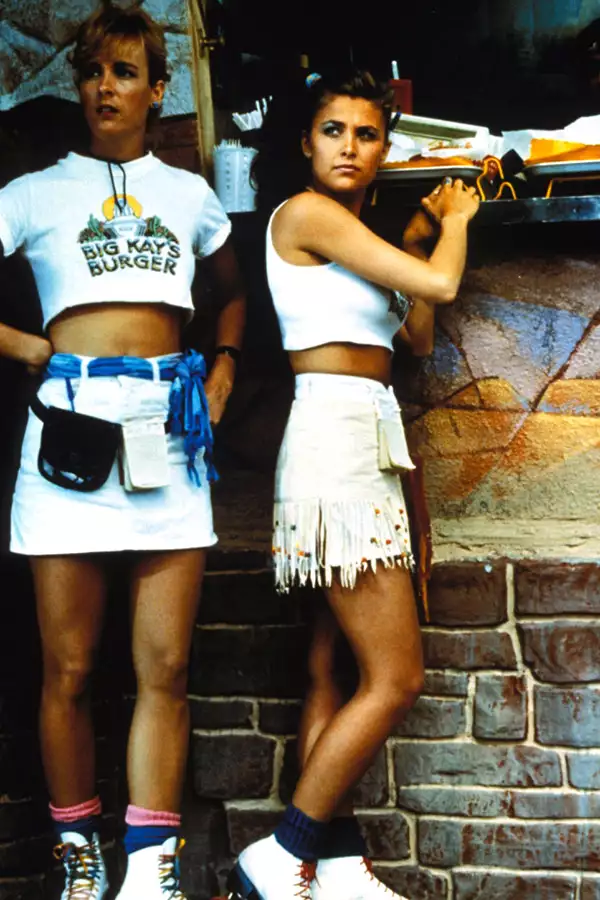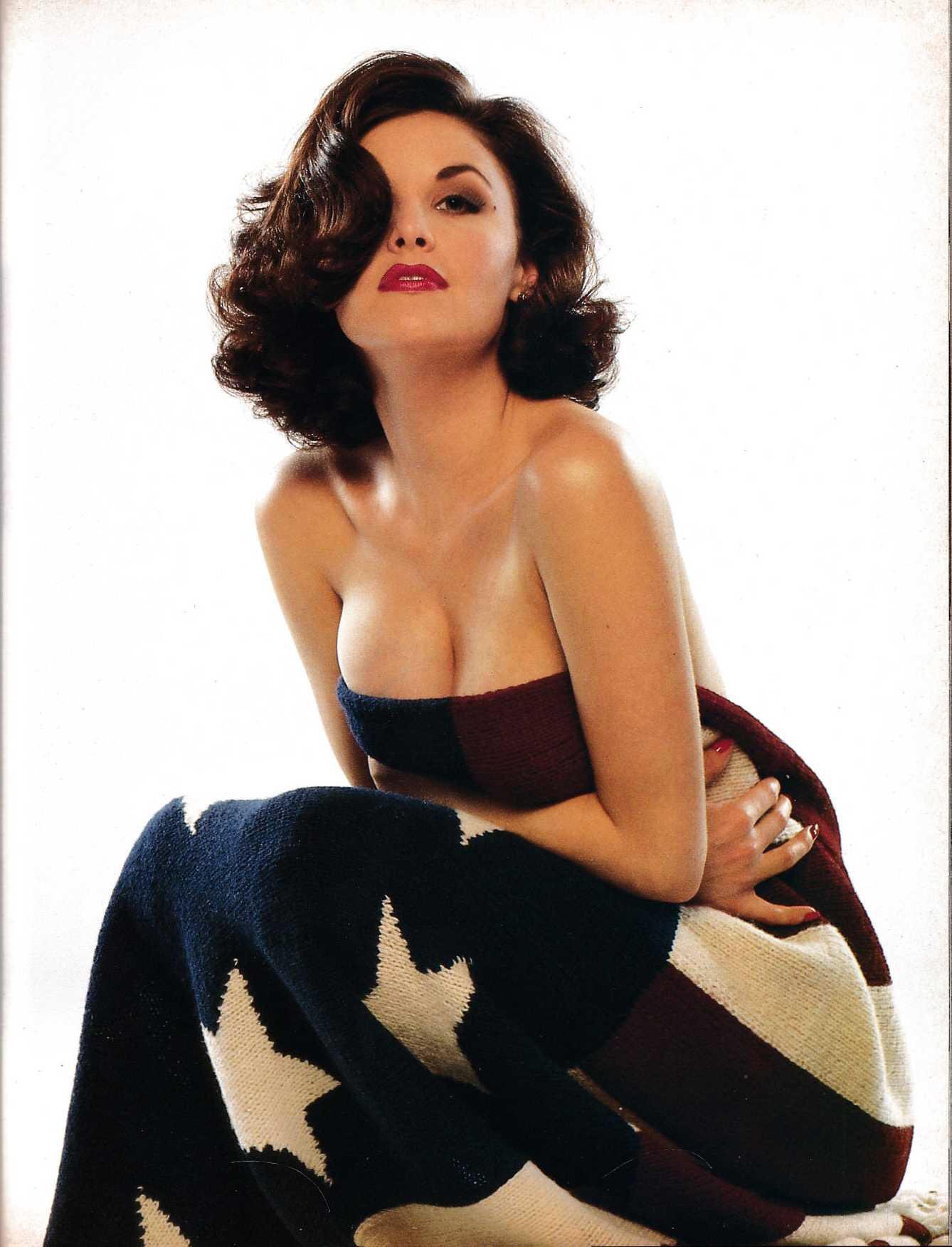Looking back at her breakout era in 1987—and the B-movie journey that made her unforgettable.
In the late 1980s, Hollywood was a wild place, bursting with teen heartthrobs, synth-pop soundtracks, and the kind of glossy, sun-drenched glam that defined an era. Amid all the familiar faces, one stood out—not for chasing trends, but for defying them. Sherilyn Fenn, with her porcelain skin, jet-black hair, and an otherworldly screen presence, brought something different to the table: mystery, vulnerability, and fire. By 1987, Fenn had already built an eclectic résumé full of cult classics and experimental roles. She wasn’t just another pretty face—she was a fearless performer, willing to get weird, go dark, and push boundaries.

Fenn’s rise wasn’t conventional. Before the breakout fame that would eventually come with Twin Peaks in the ’90s, she was a regular in B-movies—those low-budget, genre-spanning gems where young stars were made or forgotten. Yet even in her earliest roles, Fenn had a magnetism that couldn’t be ignored.
She first appeared in The Wild Life (1984), a teen party flick featuring Chris Penn, Eric Stoltz, and a soundtrack that practically screamed “Reagan-era youth.” Fenn’s role was small, but her smoldering charisma was hard to miss. From there, she jumped into Thrashin’ (1986), a skateboard action movie starring a young Josh Brolin and Pamela Gidley. A kinetic mash-up of skating culture, punk energy, and teen romance, Thrashin’ now holds a place in the pantheon of ’80s nostalgia. And while it wasn’t Oscar material, it helped Fenn build a fanbase—and a reputation for picking roles that were a little offbeat.

Also in 1986 came The Wraith, a car-racing revenge fantasy starring Charlie Sheen and Nick Cassavetes. The film was equal parts surreal and stylish, a kind of supernatural Fast & Furious decades before its time. Fenn played Keri Johnson, the girlfriend caught in the middle of gang violence, fast cars, and ghostly vengeance. Her performance added emotional depth to an otherwise pulpy premise. Whether behind the wheel or caught in a moment of anguish, Fenn had screen presence in spades.
In 1987, she starred in Zombie High, a horror-comedy hybrid about brainwashed prep school students. Alongside Virginia Madsen, Fenn embraced the campiness of the genre, once again proving she could elevate even the most eccentric scripts with a blend of humor and sensuality.

But perhaps one of the most fascinating early roles was her appearance in Meridian (also known as Phantoms), a Beauty and the Beast-inspired erotic fantasy directed by Charles Band. Set in a crumbling European castle, the film was more gothic fairy tale than traditional horror. Fenn portrayed Catherine Bomarzini, a woman caught between romantic dreams and ancestral curses. It was moody, mystical, and unabashedly sensual—and Fenn owned every frame.
Even in minor parts, she left a lasting impression. In Just One of the Guys (1985), a now-iconic teen comedy about gender roles and high school politics, she played Sandy, a seductive student trying to get cozy with a new guy on campus—who just happened to be a girl in disguise. The role could have been forgettable in someone else’s hands. But Fenn brought a mischievous energy that made the moment crackle with awkward hilarity.

One of the most fascinating entries in Fenn’s early career is a short student film from the American Film Institute titled Dummies (1985). Directed by Laurie Frank and co-starring then-unknown Johnny Depp, the film was an experimental piece that reflected the artistic freedom young filmmakers had in those days. It also sparked a real-life romance between Fenn and Depp—one that would last over three years and result in an engagement. Their chemistry wasn’t just onscreen; it was a genuine connection that made headlines in the gossip columns of the day.
In 1987, fans of 21 Jump Street—the edgy cop series starring Depp—were treated to a small reunion when Fenn guest-starred in a season-one episode titled “Blindsided.” Playing a romantic interest once again, her performance added depth and emotional stakes to the storyline, subtly reminding audiences of the real-life sparks between the two.

By the end of the decade, Sherilyn Fenn had quietly become one of Hollywood’s most intriguing rising stars. She hadn’t starred in a blockbuster yet. She hadn’t topped any A-list rankings. But she had cultivated something far rarer: a body of work that was bold, diverse, and defiantly her own. In a time when many actresses were being pigeonholed into stereotypes—cheerleader, damsel, love interest—Fenn broke the mold. She was always a little strange, a little dangerous, and utterly magnetic.
Of course, everything would change in 1990 when she took on the role of Audrey Horne in Twin Peaks, David Lynch’s eerie, genre-defying mystery series. As the sultry, troubled high school girl with a flair for seduction and espionage, Fenn became a cultural icon overnight. But the seeds of Audrey’s complex allure were planted years earlier—in the haunted stares, flirtatious smiles, and quiet strength of Fenn’s performances in the B-movies of her youth.

Now, looking back, 1987 stands out not just as a year in which Sherilyn Fenn worked hard, but as a moment just before the breakthrough—a chapter rich with experimentation, raw talent, and risk-taking. Long before Hollywood knew what to make of her, Sherilyn Fenn was already one of the most compelling actresses of her generation. And those who were paying attention back then knew: greatness was only a matter of time.